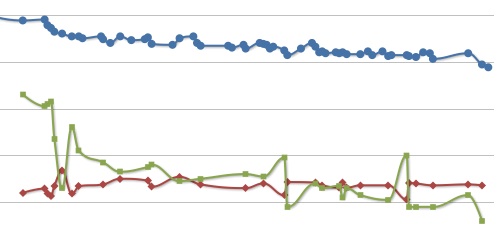For some reason I have an aversion to the quantified self terminology. I guess I’m suspicious of excessive overt tracking of stuff that I hope to make into unconscious habit. It probably goes back to when I used to be a runner. I ran a couple of marathons and I would of course log every run and used upcoming races to motivate my training. I ran with a pulse monitor and used the real-time feedback to adjust my pace to the intention of each training session.
I was incredibly disciplined about my training right up until I stopped improving. Once I plateaued I just couldn’t stick with it. I experienced a similar pattern with biking, rowing, yoga, and everything else I tried. Train hard, track everything, plateau, quit.
Then a few years ago I read about a study that looked at motivation and it made the point that sometimes leaving things open ended actually improves our ability to stick with it. I’ve been looking for that study for two years but can’t find it again. It has stuck in my head though and fundamentally changed how I think about things. It’s made much more skeptical of the value of competitions and other goals in achieving long-term fitness. And something is different for me now because I’ve been doing CrossFit for three years without quitting. Of course, it might just be that I haven’t plateaued yet. But I also think nurturing an open-ended mindset has helped.
Having plateaued and quit so many times I guess I’m just skeptical of the value of tracking the minutia of my exercise life. I wouldn’t have known I plateaued if I hadn’t tracked the data after all.
So not too long ago when Sara Winge forwarded me a link to an article on the “datasexual” with the subject line “You’ve been memed” I was taken aback. “Me? I don’t track stuff. I don’t own a Fitbit. In fact, I’m a huge skeptic of the value of all this stuff. To me it seems too much like putting the cart of technology before the horse of just doing the work.” But then I thought about it honestly and I had to admit it. Who am I kidding? I’m an obsessive tracker.
I track every Crossfit workout on Beyond The Whiteboard. I started a paleo / ancestral health diet in December and I use a kitchen scale to measure portions. I kept a journal of every meal for three months and when that got cumbersome I started taking a picture of them with my phone. I do it to encourage consciousness of what I’m eating and to make sure I’m keeping my macronutrient balance where it should be. I weigh myself at least three times each week and log weight, waist, and neck measurements each time to estimate body fat.

Not too long ago after I rowed what felt like a fast 2k during a crossfit workout I dug up my old logs from the ’90s to see how it compared to the twenty-something me (slower of course, but not awful). I still had those logs and knew where to find them.
From there it gets more obsessive. Once I changed my eating habits I started getting a full lipid panel and other tests every three months to assess the impact of my new high fat / low carb diet (I get over 2/3 of calories from fats now). The next time around I plan to add tests for inflammation markers and a few other things.
I wasn’t happy with my doctor only being able to order fasting blood sugar though, so I bought a glucometer and started monitoring my own real-time blood sugar. I measure fasting and +1, +2, and +3 hour postprandial glucose levels after various meals to evaluate my insulin response and to better tune my diet. I also occasionally measure pre- and post-workout glucose levels to optimize when to workout relative to mealtime.
Periodic at home A1c tests verify that my long-term glucose levels are in keeping with what I’m measuring in real time — as a correlation to verify test accuracy and to help me interpret the short-term results. Oh, and I ordered a 23andMe test kit to see (among other things) if I have any genetic disposition to diabetes.
So, I guess I have to admit it. Quantifying the self isn’t just something other people do, it’s something I do. Yet I remain a skeptic.
The line I’m trying to walk is between obsessive tracking that results in post-plateau burnout and using tracking to maintain awareness and intention while trying to remain open ended. “Maybe I’ll work out today.” “Maybe I’ll lose a few pounds, or maybe I’ll gain a few.” But at the same time I want to take advantage of the awareness that comes from tracking. More importantly, I want to know what the data says about how healthy I am. A degradation in insulin response wouldn’t just be a problem with a plateauing exercise program after all, it would have major long-term health impact.
Related:
